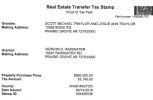Chandler
Member
- Joined
- Mar 16, 2012
- Professional Status
- Certified Residential Appraiser
- State
- Arizona
If there's a good private sale that offers support, I wouldn't necessarily use it, but I would mention the sale in the addendum and if I could not verify condition or transaction details I'd mention that as well.



